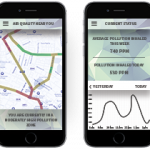 Pollution is a problem in most cities around the world, and it’s a problem that is increasingly being tackled with help from the crowd.
Pollution is a problem in most cities around the world, and it’s a problem that is increasingly being tackled with help from the crowd.
I’ve written previously about attempts to crowdsource environmental monitoring, with projects such as the Smart Citizen Kit aiming to build a global network of sensors that will report back on local environmental conditions. They’re looking to build up a knowledge base of things such as CO and NO2 levels, or what our light and noise pollution is like.
With the rise in wearable technology over the last few years, it was only a matter of time before a wearable sensor was developed to help wearers to track pollution levels wherever they happened to be.
One such product is Breathe, which is a small white clip that you can attach to any piece of clothing. The device is capable of measuring the air quality as we move through particular environments.
When the device is connected up with the Breathe app, it then allows the wearer to track the air quality in all of the locations they’ve visited that day, providing them with a kind of heat map of pollution to help them try and pick cleaner routes. It will even warn the user if the air quality becomes particularly dangerous at any time.
What’s more, this data is then gathered up together and pooled with other Breathe users to provide a crowdsourced database of air quality levels around the world.
It’s a nice app, although I think one thing that is possibly missing is a gamification element. We’ve seen with services like Opower how effective this can be at changing our behaviors.
OPower works to improve our energy efficiency by utilizing gamification to encourage people to use less energy.
The company works with utility companies to provide households with data on how much energy they are consuming, how they match up with neighbors, and if they are close to any new milestones.
Could such an approach be factored into Breathe? Obviously it’s hard for users to improve air quality, but there could perhaps be a gamification of the recording itself to ensure richer data is gathered.
Overall though it’s a nice approach to improving the data around air quality in our towns and cities.
That is a cool project. Anything that improves the environment is good in my book.